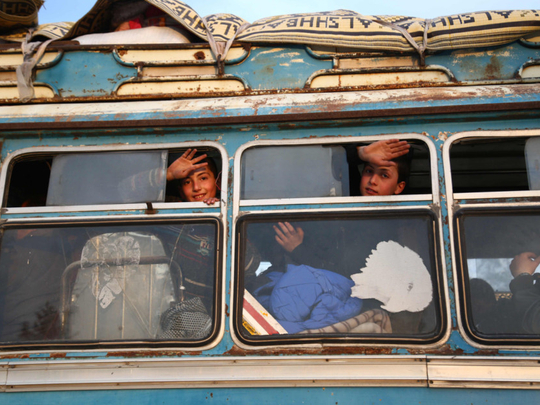
Beirut: The prospect of Western military action in Syria that could lead to confrontation with Russia hung over the Middle East on Friday but there was no clear sign that a US-led attack was imminent.
International chemical weapons experts were travelling to Syria to investigate an alleged gas attack by government forces on the town of Douma which killed dozens of people.
Two days ago US President Donald Trump warned that missiles “will be coming” in response to that attack.
The allies of Syrian President Bashar Al Assad were eager on Friday to lay blame for the crisis not with him but with Trump.
Russian Deputy Prime Minister Arkady Dvorkovich said international relations should not depend on one person’s morning mood, in apparent reference to Trump’s tweets.
“We cannot depend on what someone on the other side of the ocean takes into his head in the morning. We cannot take such risks,” said Dvorkovich, speaking at a forum.
Russia has warned the West against attacking Al Assad, who is also supported by Iran, and says there is no evidence of a chemical attack in Douma, a town near Damascus which had been held by rebels until this month.
Vassily Nebenzia, Moscow’s ambassador to the United Nations, said he “cannot exclude” war between the United States and Russia.
“The immediate priority is to avert the danger of war,” he told reporters.
“We hope there will be no point of no return.”
British Prime Minister Theresa May won backing from her senior ministers on Thursday to take unspecified action with the United States and France to deter further use of chemical weapons by Syria.
Trump was also expected to speak with French President Emmanuel Macron, who said on Thursday France had proof the Syrian government carried out the Douma attack and would decide whether to strike back when all necessary information had been gathered.
But on Friday, Russian Foreign Minister Sergei Lavrov said Moscow had “irrefutable” evidence that an alleged chemical weapons attack in Syria was staged with the help of a foreign secret service.
“We have irrefutable evidence that this was another staged event, and that the secret services of a certain state that is now at the forefront of a Russophobic campaign was involved in this staged event,” he said during a press conference.
He also warned that Western intervention in Syria would lead to new waves of migrants to Europe.
Even small acts could “lead to new waves of migrants to Europe and a lot of other developments that aren’t at all needed, either by us or our European neighbours, and can only gratify those who are protected by an ocean,” Lavrov said at a press conference in Moscow.
Trump himself appeared on Thursday to cast doubt on at least the timing of any US-led military action, tweeting: “Never said when an attack on Syria would take place. Could be very soon or not so soon at all!” He met his national security team on the situation in Syria later in the day and “no final decision has been made,” the White House said in a statement.
“We are continuing to assess intelligence and are engaged in conversations with our partners and allies,” it said.
A team of experts from the global chemical weapons watchdog, the Organisation for the Prohibition of Chemical Weapons, was travelling to Syria and will start its investigations into the Douma incident on Saturday, the Netherlands-based agency said.
The capture of Douma has clinched a major victory for Al Assad, crushing what was once a centre of the insurgency near Damascus, and underlines his unassailable position in the war.
He has cemented his control over most of the western, more heavily populated, part of the country, with rebels largely contained to two areas on Syria’s northern and southern borders.
They still control the northwestern province of Idlib, near Turkey, and a southern region around Deraa, on the border with Jordan.
Turkish forces and rebel allies control territory in northern Syria, while US-backed Kurdish forces hold wide areas of the northeast, and pockets of Daesh fighters remain.
But none of those any longer directly threaten Al Assad’s grip on power, which has been reinforced by Russian air power and Iran-backed fighters on the ground.












